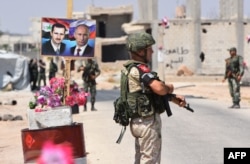U.N. envoy for Syria Staffan de Mistura warned Thursday of a "perfect storm" building in northwestern Syria while expressing special concern for the civilians living in the Idlib area where Syrian forces backed by Russia are expected to launch an assault to clear the last major stronghold under opposition control.
"We are worried about any hurried escalation," de Mistura told reporters in Geneva.
WATCH: UN Envoy Warns Against Use of Chemical Weapons in Battle for Idlib
The government of President Bashar al-Assad has said it plans to clear Idlib of militants from the Nusrah Front. There has been a surge in airstrikes and shelling in the area this month, raising fears of an all-out offensive similar to what happened previously in Aleppo and Eastern Ghouta.
"Idlib is the last major stronghold of terrorists who are trying to gamble on the status of the de-escalation zone and hold civilians as human shields and bring the armed formations ready for negotiations with the Syrian government to their knees," Russian Foreign Minister Sergey Lavrov said Wednesday in Moscow, according to the state-run Tass news agency. "So, from all standpoints, this ‘abscess’ has to be liquidated."
De Mistura said Syria as a sovereign country has every right to recover its territory, and that U.N.-listed terrorist groups such as the Nusrah Front need to be defeated. But he called for more time to allow discussions among the multiple countries involved in the conflict in Syria, and reminded warring parties of their duty to protect civilians.
The U.N. envoy pointed to previous situations like those in Aleppo and Eastern Ghouta where humanitarian corridors were used to evacuate civilians and fighters who wanted to leave and escape the pro-government offensives.
In many cases those who fled went to Idlib, and as he called Thursday for fresh humanitarian efforts to facilitate evacuations, de Mistura noted there is "no other Idlib" left.
About three million people live in Idlib governorate, including more than a million who were displaced from other parts of Syria. The U.N. says more than two million people in Idlib need humanitarian assistance and aid agencies are prepositioning supplies to prepare for a further deterioration in the situation.
Potential ‘humanitarian catastrophe’
U.N. Secretary-General Antonio Guterres expressed deep concern Wednesday there could be a "humanitarian catastrophe."
"The secretary-general urgently appeals to the government of Syria and all parties to exercise restraint and to prioritize the protection of civilians," said U.N. spokesperson Stephane Dujarric. "He calls on the Astana (Kazakhstan talks) guarantors to step up the efforts to find a peaceful solution to the situation in Idlib, the last remaining de-escalation zone."
Russia, Iran and Turkey are the guarantors of the de-escalation zones. The Russian and Turkish foreign ministers met August 24 to discuss the issue.
Russia and Syria have accused the West of planning to carry out a chemical weapons attack in Idlib with the help of the Syrian civil society group the White Helmets and to blame it on the Assad regime.
A report from the Syrian news agency SANA claimed Wednesday that Turkish trucks "under the supervision of foreign mercenaries" and with help from the White Helmets were transporting gas cylinders into Idlib. The report said, "About 20 people with dark brown skin who speak French and English" took part in the operation.
The United States has warned that it will hold the Assad government and Russia accountable for any escalation in Idlib, including the use of chemical weapons.
State Department spokesperson Heather Nauert told reporters Tuesday that senior administration officials have spoken with their Russian counterparts, "to make it very clear that the United States government and its partners would respond to any verified chemical weapons use in Idlib, or elsewhere in Syria for that matter, in a swift and appropriate manner," she said.
De Mistura said the United Nations is talking with all of the major players in Syria, especially the United States and Russia based on what he called the "warnings and counter-warnings from each country."







